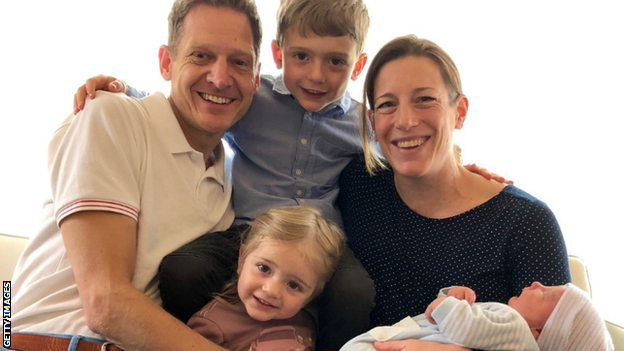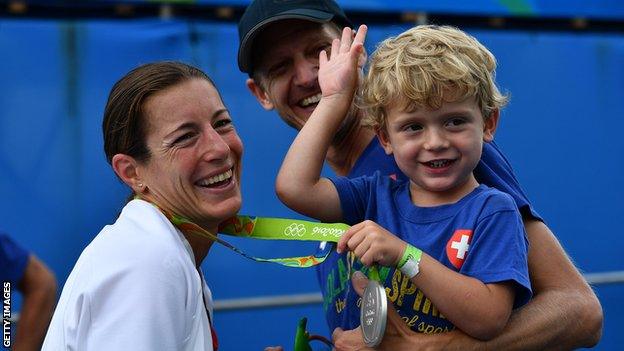World Triathlon Series: Nicola Spirig on racing 12 weeks after having third child
- Published

Nicola Spirig and husband Reto Hug have three children: Yannis (top), Malea (middle) and Alexis
World Triathlon Series Grand Final |
|---|
Venue: Lausanne, Switzerland Date: 31 August-1 September |
Coverage: Live coverage of elite men's and women's races on Connected TV and online and highlights on BBC Two. Full details. |
When 2012 Olympic champion Nicola Spirig had her first child, she was not sure whether she would ever return to triathlon.
But just 12 weeks after her third child was born in April, the 37-year-old was back competing.
Incredibly, Spirig - the only mother and second-oldest competitor in the race - finished eighth at the event in Hamburg meaning she is on track to reach the 2020 Olympics in Tokyo.
"I'm really excited to try and go to my fifth Olympics," Spirig tells BBC World Service's The Conversation.
"Some people say, 'why would you go a fifth time? You've already been four times'.
"But to me, it's always a new challenge. This time with three kids, it's definitely a new challenge again.
"I'm really looking forward to that and we kind of leave it open what will be afterwards."
Spirig needs to be ranked in the world's top 45 to qualify for Tokyo and is currently 33rd, with another strong performance expected in the Grand Final of the World Triathlon Series in Lausanne on Saturday - a race which will be shown live on the BBC.
She gave birth to son Yannis in 2013, daughter Malea in 2017, and this year to another son, Alexis, but children certainly do not seem to be slowing Spirig down.
In fact, balancing motherhood and competition provides new motivation.
"It's not easy to do but I think and hope that people like me can show that it's doable and that more women will try to do it in the future," she adds.
"I want to show them [her children] that they should find whatever they love, whatever they have a passion for and try to do that. On the other hand, I don't want them to be too consumed by me being someone special.
"I want to be the best mum in the world and not the best athlete in the world."
Balancing work with baby number one
Back in 2012, Spirig beat Sweden's Lisa Norden in a thrilling photo finish to claim gold in London. After such a landmark success she decided the time was right to start a family with her husband, fellow triathlete Reto Hug, despite thinking it could jeopardise her career.
"I didn't know what to expect," Spirig says of that time.
"I knew that if I had a family, that would be my priority so sport would not be the one and only thing I would care about in my life.
"I wasn't sure if I would be able to get back to my best performance physically but also I wasn't sure if mentally I would still be motivated."
The following year, Yannis was born. Six-time European champion Spirig describes herself as "a person who needs sport", so naturally she was up and about a few days later.
There is no shortage of pressure for women to 'get back in shape' after giving birth, and for athletes the stakes are even higher.
Unsure whether she was exercising for fun or to return to competition, Spirig began training again. But as with most new parents, balancing work with a baby proved challenging.
"My husband was working 100% at that time," Spirig explains.
"I tried to start training three times a day and it just didn't work out for me, and I didn't want to have to organise people caring for the little one every day three times because that was really stressful.
"So my husband and me had a conversation after six months and I said, 'it doesn't work, I'm happy to finish my career or you reduce your job and just work 50%'.
"He was the one who said he didn't like his job and was happy to quit and look after the baby. That was the turning point. I thought that was amazing."
Pelvic floor muscles, breastfeeding and 'effective training'
Spirig and Hug may have resolved the childcare issue, but other aspects of training proved challenging as well.
The law graduate explains she had to be careful with her pelvic floor muscles, which stretch during pregnancy, before starting to run and how breastfeeding means babies "dictate the day".
But Spirig overcame these challenges too. At the Rio Olympics, three years after Yannis was born, the Swiss took silver and was greeted by him and Hug at the finish line - a moment she describes as "really emotional".

Yannis and Hug were waiting to celebrate silver with Spirig in Rio
The year after Spirig's daughter Malea was born, she won gold at the European Championships in Glasgow, where she was the second-oldest competitor behind a 41-year-old Maria Czesnik.
Should she make it to Japan, Spirig will be competing in her fifth Olympics, having finished sixth in Beijing and 19th in Athens.
And having children will help with her preparation for Tokyo. Like four-time Olympic champion Laura Kenny and 23-time Grand Slam singles champion Serena Williams, Spirig says being a mum has positive effects on her performance too.
"When I get time to train, it might be less than before but I'm really effective," she adds.
"I want to go out and give 100% because it's time away from my kids. When I used to have a bad training session, I would think about it and be unhappy for a long time. Now I come home and don't have time to think about it.
"I have some hopefully smiling kids at home. They need me and I have to go and play with them."
BBC Sport has launched #ChangeTheGame this summer to showcase female athletes in a way they never have been before. Through more live women's sport available to watch across the BBC this summer, complemented by our journalism, we are aiming to turn up the volume on women's sport and alter perceptions. Find out more here.